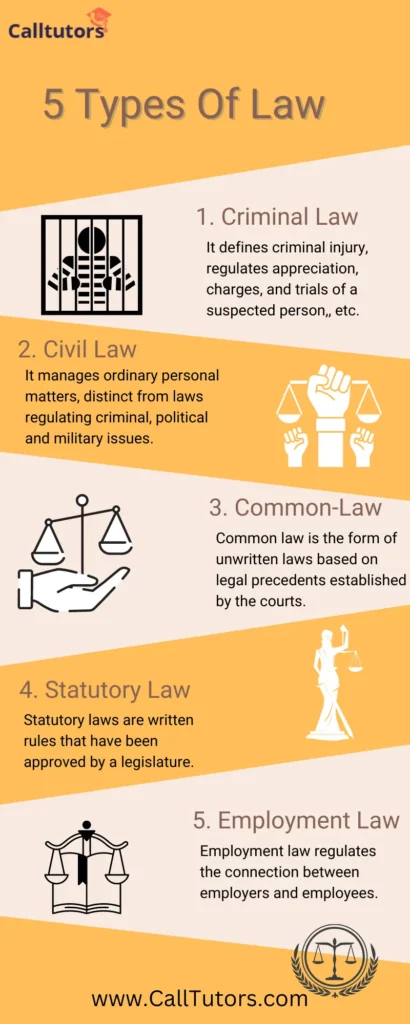Every citizen has been given several rights. Law is a fundamental part of the legal in the constitution. A constitution is a basic law of the state providing the rules by which the state is governed setting out the rights and responsibilities of the states and citizens.
Law is mainly a set of rules which might be created and enforced by a particular country or community by a social or governmental institution to regulate the actions of its members. India has federal legislation, i.e., based mostly on the parliamentary legislature, court laws, and customary and non-secular laws. The Indian judicial system is developed by judges’ decisions, orders, and judgments.
In this blog, We’ll discuss the different types of law in the world.
What is law?
Table of Contents
Law is a structure of rules that society and government develop to deal with crime, business agreements, and social relationships. A body of rules of action is determined by controlling authority and secured legal force.
What Are The Popular Fields of Law?
These are the highest-paying fields of Law.
| Popular Fields of Law | Salary (Per year) |
| Admiralty Lawyer | $55,870 to $187,200 |
| Business Lawyer | INR 6.9 Lakh per annum |
| Constitutional Lawyer | £58K – £92K |
| Criminal Lawyer | £42,239.68 |
| Environmental Lawyer | £64,300 |
| First Amendment Lawyer | £20,000 to £40,000 |
| Health Care Lawyer | £50,000 |
| Intellectual Property Lawyer | £60,000 |
Types of Law
These are the following types of law.

Criminal Law
Criminal law is the form of law that defines criminal injury, regulates appreciation, charges, and trials of a suspected person, and fixes penalties and modes of treatment applicable to convicted criminals. Understanding the background of those who enforce and interpret the law, such as lawyers, is crucial, hence the importance of lawyer background checks.
The criminal is only one of the tools by which organized societies protect the security of individual interest and ensure the group’s survival. Family, school, and religion initiated the standards of conduct, the office, and factory; the regulation of civil life enforced by ordinary police powers.
Criminal cases are divided into two types:
- Felony: It is a punishable crime by imprisonment for longer than one year. Common includes Murder, robbery, treason, and kidnapping.
- Misdemeanor: It is a crime by imprisonment for a year or less. Common includes Petty theft, driving under the influence, and minor in possession of alcohol.
Civil Law
Civil law is the part of the law of a state or nation that manages ordinary personal matters, distinct from laws regulating criminal, political and military issues. Examples are a scandal, breach of contract, and property damage.
In civil cases, punishment always contains a monetary award and never consists of imprisonment, and defendants are not entitled to the same legal protections are as the criminally accused.
Common-Law
Common law is the form of unwritten laws based on legal precedents established by the courts. Common law impacts the decision-making process in unusual cases where the outcome cannot be determined based on existing statutes or written law rules.
Features of common law system:
- There will be no codified or written constitution always.
- Judicial decisions made at the highest court can usually be formed only by the same court of law.
- All that is not specially prohibited by law is permitted.

Statutory law
Statutory laws are written rules that have been approved by a legislature. Statutory may require specific action, prohibit them, act as a declaration of intention, or layout how the government will work in certain circumstances. Statutes are written laws that are established by enactments expressing the will of the legislature. This comes in the form of bills or acts.
Different types of statutory law are:
- Declaratory statutes
- Remedial statutes
- Temporary statutes
- Perpetual statutes
- Affirmative statutes
- Personal statutes
- Real statutes
Employment laws
Employment law regulates the connection between employers and employees. It controls what employers can expect from employees, what employers can ask employees to do, and employees’ rights at work. It could refer to everything from your agreement through to laws that safeguard against discrimination and unfair discharge.
What does employment law cover?
- Age discrimination
- Bullying and harassment
- Disability
- Employment contract
- Equal pay
- Parental leave
- Minimum wage
Family law
Family law refers to the law regulating the family relationship, including marriage and divorce, treatment of the children, and related financial matters.
Why is family law important?
Family laws layout and protect the rights and responsibilities of a family member across a wide range of situations. It is designed to provide a basis for achieving fair and impartial results for all family members, whether adults or children.
Human rights law
Human rights are basic rights, and freedoms belong to every person in the world, from birth until death. These rights are built on dignity, fairness, equality, respect, and independence.
How do human rights help you?
- Your rights have expressed your own opinions.
- You have the right to an education.
- Right to private and family life.
- You have the right not to be wrongly punished by the state.
Intellectual property law
Intellectual property law is concerned with laws to protect and enforce the rights of the creators and owners of invention, writing, music, design, and other works, known as intellectual property. There are several areas of intellectual property, including copyrights, trademarks, patents, and trade secrets.
- Copyright law: It protects the right of creators in their work in fine arts, publishing, entertainment, and computer software. This law protects the work owner if others copy or display the owner’s work without permission.
- Trademark law: Trademark owners can prevent others from using their marks or marks which they involved similar so that customers would not be able to recognize the origin. Federal and state laws control trademarks, but the Lahman act is the primary source of trademark protection.
- Patent law: It grants protection for an innovation which can be products, processes, or design, and provides an implementation for protection of the invention. The patent law promotes sharing new development with others to foster innovation.
- Trade secrets: They are practices, formulas, designs, or processes used in a business, designed specifically to provide a competitive advantage to a company.
Media law
Media law is a legal field related to the telecommunication industry’s legal regulation, information technology, broadcasting, and entertainment.
Tort law
Tort law is the huge majority of the legal system that derives from them; any instance of harmful behavior such as physical attacks on one person or with the use and enjoyment of one land, economic interest, reputation, and privacy.
What is the difference between civil law and the common law legal system?
| Civil law | Common law |
| It is not always a written constitution or tabulated laws. | There is generally a written constitution based on specific codes. |
| Judicial decisions are binding. | Only legislative enactment is considered binding for all. |
| There is extensive freedom of contract. | It is a significant influence in some civil law jurisdictions. |
| Everything is permitted that is not distinctly prohibited by law. | More limited- a number of provisions implied by law into contractual relationships. |
Which Law Degrees & Specializations Best?
All kinds of degree are best for the law student. These are the best law degrees & specializations below.
1. UG Law Courses
Here are the best law courses after the 12th.
| Law Courses After 12th | Duration |
| LLB.- Bachelor’s courses in law | 3 Years |
| LLB. (Hons.)- Bachelor of legislative law (honors) | 5 Years |
| BBA+LLB.- Bachelor of business administration & Bachelor of legislative law | 5 Years |
| B.Sc+LLB. – Bachelor of Science & Bachelor of legislative of law | 3 Years |
| B.S.L+LLB. – Bachelor of social and legal science & Bachelor of legislative of law. | 3 Years |
2. PG Law Courses
Following are the best PG law courses with degrees and specializations.
| PG Law Courses | Duration |
| LLM.- Masters of law | 2 years |
| LLM.(business law)- Master of legislative law in business law. | 2 Years |
| LLM.- Master of law in Criminal law. | 1 Year |
| LLM. (Energy law)- Master of law in energy law. | 3 Months – 5 Years |
| LLM. (human rights)- Master of law in human rights. | 1-2 Year |
3. Law Diploma Courses
These are the best law diploma courses.
| Law Diploma Courses | Duration |
| Diploma in criminal law | 1 Year |
| Diploma in business law | 1 Year |
| Diploma in cyber law | 5 Years |
| Diploma in labor law | 1 Year |
| Diploma in taxation law | 1 Year |
4. Certificate Law Courses
Following are the main certificate law courses available for students.
| Certificate Courses in Law | Duration |
| Advanced certificate on Companies Act 2013 | 3 months |
| Certificate course in Law of Financial Services | 4 months |
| Certificate course in Immigration Laws | 4 months |
| Certificate in Anti-human trafficking | 6 months – 2 years |
| Certificate course in Solid waste management and law | 4 months |
Conclusion (types Of law)
We discussed the different types of laws and many courses and degrees of law. Some rules and regulations need to be set to sustain justice and equality in society. We have proper law in our society that tells us how to interact with people. It accommodates people with different cultures, backgrounds, and means to live in harmony with each other. Our constitution has civil law, criminal law, human rights law, etc, we can choose one of them to study the law.
Now, we hope that you have understood the types of law. And if you need Law Assignment Help, then feel free to contact us.
Frequently Asked Questions
What are the main branches of law?
In modern legal systems, there are two primary branches of law. These are criminal law and civil law.
What is the highest degree of law?
The highest degree of law is a doctor of Juridical Science (SJD). It is designed for experts who are looking to gain an advanced legal education after earning their JD and LLM.
Is studying LLB law hard?
It is not a very difficult course compared to other professional courses such as BTech and MBBS.



